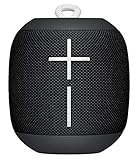Bose SoundLink Micro review: The rugged speaker you can take anywhere
It’s small, it’s cute and it’s rugged, but the Bose SoundLink Micro isn’t the best sounding tough speaker around
Pros
- Ruggedised and portable design
- Multifunctional voice-assistant button
Cons
- Terrible sound quality
- Doesn't float
- Dubious strap
Speakers come in all shapes and sizes, but the Bose SoundLink Micro is more than a little unusual. It’s a square-shaped, rubberised Bluetooth speaker about the size of your palm, has soft, rounded corners and edges, and is designed for those who want to take their music on-the-go.
The SoundLink Micro isn’t particularly cheap, though, for a speaker this small, so does it do enough to justify its hefty price tag?
Bose SoundLink Micro review: Price and competition
You can buy one for around £100, a lot of money for a speaker this small. What’s the competition, though? At this size, there isn’t much, but the closest is the UE Wonderboom, which offers almost identical features to the Bose. For a more portable solution, the Philips BT3900 EverPlay is a pocket-friendly Bluetooth speaker with an impressive sound for £50, and with an IP57 rating can be submerged in water up to 1m for 30mins.
Even smaller, you ask? The Creative Muvo 2c is a palm-sized speaker with an elegant design, and it only costs £30. The Muvo 2c is not waterproof but is IP66 certified instead, which means it’s water-resistant.
Bose SoundLink Micro review: Features and design
As mentioned, the SoundLink Micro is a rugged speaker. It measures 98 x 98mm and has a depth of 35mm. It weighs only 290g, making it easy to carry around, and it’s clad in a soft-touch, impact-resistant rubber that feels wonderfully silky under your finger. It’s available in three colours: Bright Orange, Midnight Blue and Black and it looks smart whichever colour you go for.
Alongside the speaker grille located at the front of the speaker, there’s a microphone for taking calls and a set of three buttons: plus and minus buttons for volume adjustment and a multifunction key, which can be used to activate Siri or Google Assistant on iPhones and Android devices and play or pause music.
The speaker charges via micro-USB via a port on the side of the speaker, and there’s a neat power gauge that indicates the battery level. You also get an audio cue when you switch on the speaker, informing you of the remaining percentage, and that’s important because the battery isn’t the longest lasting. Bose says it will give you around 6hrs over Bluetooth (aptX isn’t supported), which puts it behind the UE Wonderboom’s ten-hour longevity.
Around the back of the speaker, you’ll find a “tear-resistant strap” that allows you to attach it to your messenger bag, your belt or even your bike’s handlebars. I found the strap strong enough to hold onto my hand and bag, but upon shaking it vigorously the strap came undone. On the plus side, the strap does stretch a reasonable amount to allow it to fit around larger items and, the more you stretch it, the stronger the attachment is.
Finally, the speaker is also IPX7 rated, which means it’s waterproof and will survive being completely submerged for 30 minutes at up to 1m depth. However, unlike the UE Wonderboom, it doesn’t float, so make sure you’re prepared to fish it out from the bottom of the swimming pool if you drop it.
READ NEXT: UE Wonderboom review: Portable, stylish and pool-friendly
Bose SoundLink Micro review: Sound quality
So far, so good. The SoundLink Micro is a solidly designed compact speaker that will go anywhere with you. The sound quality, however, is a completely different story.
The speaker has a custom-designed transducer and a single passive radiator. Unfortunately, its sound quality barely competes with a speaker costing a third of its price.
Playing back some music, I found the speaker was unable to keep up with the different frequencies. It simply jumbles them all up and produces an awful sound.
I wouldn’t expect such a small speaker to recreate rumbling bass, but even so what the Micro manages to produce is disappointing. Its mid-bass response isn’t great either; it’s uncontrolled, overemphasised and poor. By comparison, the UE Wonderboom delivers a good quantity and quality of bass.
The lower mids are also affected by the wobbly mid-bass response, but although vocals are acceptable, the high-frequencies are ear-piercingly sibilant and I found it painful to listen to at higher volumes.
Its biggest downfall, however, is its soundstage; it’s closed, instrument separation is dreadful and frequencies struggle to work in unison. With songs that require a good soundstage, such as Pharrell Williams’ “Gust Of Wind”, the SoundLink Micro jumbles the vocals, instruments and percussions all into one messy sound. Even with its palm-sized form factor, the Creative Muvo 2c offers a more impressive soundstage over the Bose SoundLink Micro.
Bose SoundLink Micro review: Verdict
If you told me this speaker was £40, I’d excuse its poor sound for its multifunctional voice-assistant button and portable, rugged design. But at £100, I can’t do that.
If you’re looking for a portable tough speaker, I’d advise you avoid the SoundLink Micro and buy the £85 UE Wonderboom instead. Or, if you’re looking for an even more portable speaker, go for the Philips BT3900 EverPlay – a pocket-sized speaker that costs around half its price and sounds much better.
















